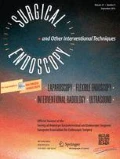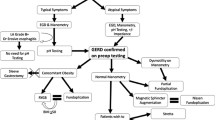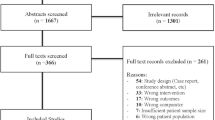Abstract
Background
The Roux-en-Y gastric bypass (RYGB) isuery ID="Q1" Text="Author:Kindly check the edit made in the article title." -->the most efficacious procedure of choice for obese patients with gastroesophageal reflux disease (GERD). The laparoscopic sleeve gastrectomy (LSG) has high rates of worsening GERD post operatively. Little evidence exists as to whether the use of objective foregut investigations has a meaningful impact on surgical procedure selection. This study examined whether a standard preoperative foregut evaluation protocol effected procedure selection in bariatric patients presenting for surgical evaluation with subjective symptoms of GERD.
Methods
Patients presenting for bariatric surgery evaluation with subjective symptoms of GERD entered into a predetermined protocol of foregut evaluation. Patients initially underwent upper endoscopy and esophagram. If the patient desired a LSG, further testing with esophageal pH testing and high-resolution manometry was ordered. If significant pathology was discovered on any of these investigations RYGB was recommended, if investigations were normal LSG was felt to be permissible. Data were collected prospectively from July 2016 to December 2018 and reviewed.
Results
One hundred and thirty-three patients were identified as being eligible to have progressed through the protocol. Pathology was commonly discovered on preoperative evaluations. On EGD Barrett’s esophagus was discovered in 4%, grade C or D esophagitis in 18% and hiatal hernia in 36% of patients. On esophagram, hiatal hernia was discovered in 42.3% of patients. Abnormal esophageal motility was discovered in 41% and abnormal DeMeester scores in 83% of tested patients. Of the 133 patients evaluated, the final procedure the patient ultimately underwent was primarily determined based on protocol test results in 24.8% of cases.
Conclusions
Foregut pathology is common in bariatric patients with subjective symptoms of GERD. Implementing a comprehensive protocol to objectively assess these patients leads to a significant clinical impact on which procedure these patients ultimately undergo.


Similar content being viewed by others
References
Hales C, Carroll, Fryar C, Ogden C (2017) Prevalence of obesity among adults and youth: United States, 2015–2016. NCHS Data Brief, No. 288, Oct 2017
Herbella FA, Sweet MP, Tedesco P, Nipomnick I, Patti MG (2007) Gastroesophageal reflux disease and obesity. Pathophysiology and implications for treatment. J Gastrointest Surg 11(3):286–290. https://doi.org/10.1007/s11605-007-0097-z
Hampel H, Abraham NS, El-Serag HB (2005) Meta-analysis: obesity and the risk for gastroesophageal reflux disease and its complications. Ann Intern Med 143(3):199–211
Salminen P, Helmio M, Ovaska J, Juuti A, Leivonen M, Peromaa-Haavisto P et al (2018) Effect of laparoscopic sleeve gastrectomy vs laparoscopic Roux-en-Y gastric bypass on weight loss at 5 years among patients with morbid obesity. The SLEEVEPASS Randomized Clinical Trial. JAMA 319:241–254
Peterli R, Wolnerhanssen B, Peters T, Vetter D, Kroll D, Borbely Y et al (2018) Effect of laparoscopic sleeve gastrectomy vs laparoscopic Roux-en-Y gastric bypass on weight loss in patients with morbid obesityThe SM-BOSS Randomized Clinical Trial. JAMA 319(3):255–265
Stefanidis D, Hope WW, Kohn GP et al (2010) Guidelines for surgical treatment of gastroesophageal reflux disease. Surg Endosc 24(11):2647–2669
Katz PO, Gerson LB, Vela MF (2013) Guidelines for the diagnosis and management of gastroesophageal reflux disease. Am J Gastroenterol 108(3):308–328
Melissas J, Braghetto I, Molina JC, Silecchia G, Iossa A, Iannelli A et al (2015) Gastroesophageal reflux disease and sleeve gastrectomy. Obes Surg 25:2430–2435
Oor J, Roks D, Unlu C, Haxebroek E (2016) Laparoscopic sleeve gastrectomy and gastroesophageal reflux disease: a systematic review and meta-analysis. Am J Surg 211:250–267
Patti M, Schlottmann F (2018) Gastroesophageal reflux after sleeve gastrectomy. JAMA Surg 153(12):1147–1148
Altieri M, Prior A (2015) Gastroesophageal reflux disease after bariatric procedures. Surg Clin N Am 95:579–591
Borbely Y, Schaffner E, Zimmermann L, Huguenin M, Plitzko G, Nett P et al (2018) De novo gastroesophageal reflux disease after sleeve gastrectomy: role of preoperative silent reflux. Surg Endosc 33:789–793
Genco A, Soricelli E, Casella G, Maselli R, Castagneto-Gissey L, Lorenzo N et al (2017) Gastroesophageal reflux disease and Barrett’s esophagus after laparoscopic sleeve gastrectomy: a possible, underestimated long-term complication. Surg Obes Relat Dis 13:568–574
Sebastianelli L, Benois M, Vanbiervliet G, Bailly L, Robert M, Turrin N et al (2019) Systematic endoscopy 5 years after sleeve gastrectomy results in a high rate of barrett’s esophagus: results of a multicenter study. Obes Surg 29(5):1462–1469
Ali M, Chaar M, Ghiassi S, Rogers A et al (2017) American Society for Metabolic and Bariatric Surgery updated position statement on sleeve gastrectomy as a bariatric procedure. Surg Obes Relat Dis 13:1652–1656
Kahrilas PJ, Bredenoord AJ, Fox M, Gyawali CP, Roman S, Smout AJ, Pandolfino JE (2015) The chicago classification of esophageal motility disorders v3.0. Neurogastroenterol Motil 27(2):160–174
Frezza EE, Ikramuddin S, Gourash W et al (2002) Symptomatic improvement in gastroesophageal reflux disease (GERD) following laparoscopic Roux-en-Y gastric bypass. Surg Endosc 16(7):1027–1031
Nelson LGGR, Haines K, Gallagher SF, Murr MM (2005) Amelioration of gastroesophageal reflux symptoms following Roux-en-Y gastric bypass for clinically significant obesity. Am Surg 71:950–953
Madalosso CASG, Gurski RR, Callegari-Jacques SM, Navarini D, Mazzini G, Pereira MD (2016) The impact of gastric bypass on gastroesophageal reflux disease in morbidly obese patients. Ann Surg 263:110–116
Mejía-Rivas MA, Herrera-López A, Hernández-Calleros J, Herrera MF, Valdovinos MA (2008) Gastroesophageal reflux disease in morbid obesity: the effect of Roux-en-Y gastric bypass. Obes Surg 18:1217–1224
Prachand VN, Alverdy JC (2010) Gastroesophageal reflux disease and severe obesity: fundoplication or bariatric surgery? World J Gastroenterol 16:3757–3761
Schirmer B, Erenoglu C, Miller A (2002) Flexible endoscopy in the management of patients undergoing Roux-en-Y gastric bypass. Obes Surg 12(5):634–638
Varela JE, Hinojosa MW, Nguyen NT (2009) Laparoscopic fundoplication compared with laparoscopic gastric bypass in morbidly obese patients with gastroesophageal reflux disease. Surg Obes Relat Dis 5(2):139–143
Yamamoto SR, Hoshino M, Nandipati KC et al (2014) Long-term outcomes of reintervention for failed fundoplication: redo fundoplication versus Roux-en-Y reconstruction. Surg Endosc 28(1):42–48
LE Braghetto I, Korn O, Valladares H, Molina JC, Henriquez A (2010) Manometric changes of the lower esophageal sphincter after sleeve gastrectomy in obese patients. Obes Surg 20:357–362
Felsenreich DMKR, Schermann M, Beckerhinn P, Kristo I, Krebs M, Prager G, Langer FB (2017) Reflux, sleeve dilation, and barrett’s esophagus after laparoscopic sleeve gastrectomy: long-term follow-up. Obes Surg 27:3092–3101
DuPree CEBK, Steele SR, Martin MJ (2014) Laparoscopic sleeve gastrectomy in patients with preexisting gastroesophageal reflux disease: a national analysis. JAMA Surg 149:328–334
Rebecchi F, Allaix M, Schlottmann F, Morino M (2017) Gastroesophageal reflux disease and morbid obesity: to sleeve or not to sleeve? World J Gastroenterol 23(13):2269–2275
Daes JJM, Said N, Daza JC, Dennis R (2012) Laparoscopic sleeve gastrectomy: symptoms of gastroesophageal reflux can be reduced by changes in surgical technique. Obes Surg 22:1874–1879
Mahawar KK, Carr WR, Jennings N, Balupuri S, Small PK (2015) Simultaneous sleeve gastrectomy and hiatus hernia repair: a systematic review. Obes Surg 25(1):159–166
Ece I, Yilmaz H, Acar F, Colak B, Yormaz S, Sahin M (2017) A new algorithm to reduce the incidence of gastroesophageal reflux symptoms after laparoscopic sleeve gastrectomy. Obes Surg 27(6):1460–1465
Oelschlager BK, Pellegrini CA, Hunter JG et al (2011) Biologic prosthesis to prevent recurrence after laparoscopic paraesophageal hernia repair: long-term follow-up from a multicenter, prospective, randomized trial. J Am Coll Surg 213(4):461–468
Goitein D, Sakran N, Rayman S, Szold A, Goitein O, Raziel A (2017) Barium swallow for hiatal hernia detection is unnecessary prior to primary sleeve gastrectomy. Surg Obes Relat Dis 13(2):138–142
Ghassemian AJ, MacDonald KG, Cunningham PG, Swanson M, Brown BM, Morris PG et al (1997) The workup for bariatric surgery does not require a routine upper gastrointestinal series. Obes Surg 7(1):16–18
Saarinen T, Kettunen U, Pietiläinen KH, Juuti A (2018) Is preoperative gastroscopy necessary before sleeve gastrectomy and Roux-en-Y gastric bypass? Surg Obes Relat Dis 14(6):757–762
Acknowledgements
We would like to acknowledge Debra Allan, MSN, CBN and the entire bariatric team at the University of Iowa Hospitals and Clinics.
Author information
Authors and Affiliations
Corresponding author
Ethics declarations
Disclosure
Rhys Kavanagh, Jessica Smith, Umair Bashir, Dana Jones, Emily Avgenakis and Peter Nau have no conflicts of interest or financial ties to disclose.
Additional information
Publisher's Note
Springer Nature remains neutral with regard to jurisdictional claims in published maps and institutional affiliations.
Rights and permissions
About this article
Cite this article
Kavanagh, R., Smith, J., Bashir, U. et al. Optimizing bariatric surgery outcomes: a novel preoperative protocol in a bariatric population with gastroesophageal reflux disease. Surg Endosc 34, 1812–1818 (2020). https://doi.org/10.1007/s00464-019-06934-4
Received:
Accepted:
Published:
Issue Date:
DOI: https://doi.org/10.1007/s00464-019-06934-4




